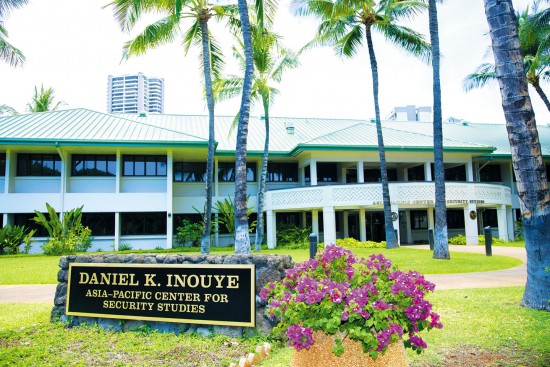What are DoD Regional Centers?
The Defense Security Cooperation Agency (DSCA) is the executive agent for several regional centers which offer courses, seminars, workshops, research and dynamic outreach among U.S. and foreign military, civilian, and non-government actors. These regional centers include:
Asia-Pacific Center for Security Studies (APCSS) (Honolulu, HI)
The APCSS addresses regional and global security issues, inviting military and civilian representatives of the United States and Asia-Pacific nations to its comprehensive program of executive education and workshops, both in Hawaii and throughout the Asia-Pacific region. APCSS’ mission is to build capacities and communities of interest by educating, connecting, and empowering security practitioners to advance Asia-Pacific security.
Center for Hemispheric Defense Studies (CHDS) (Washington DC)
The William J. Perry Center for Hemispheric Defense Studies (The Perry Center) addresses regional and global security issues, inviting military and civilian representatives of the United States and the Americas to its programs to build capacities and communities of interest by educating, connecting, and empowering security practitioners to advance Hemispheric security.
Africa Center for Strategic Studies (ACSS) (Washington DC)
The Africa Center is the Department of Defense institution for strategic security studies, research, and outreach in Africa. The Africa Center engages African partner states and institutions through rigorous academic and outreach programs that build strategic capacity and foster long-term, collaborative relationships. The Africa Center for Strategic Studies supports United States foreign and security policies by strengthening the strategic capacity of African states to identify and resolve security challenges in ways that promote civil-military cooperation, respect for democratic values, and safeguard human rights.
Near East-South Asia Center for Strategic Studies (NESA) (Washington DC)
The Center focuses on building sustained, engaged communities of influence and partnership among security professionals and leaders in the region that extends from North Africa, across the Arabian Peninsula and into South Asia. While the Department of Defense funds and oversees NESA, the Center also has close ties to the Department of State, so participants in NESA programs are introduced to the thinking and operation at both of these departments as they learn the structure and functions of the U.S. government.
Additionally, the George C. Marshall European Center for Security Studies at the Marshall Center in Garmisch, Germany, offers a Eurasian Foreign Area Officer (FAO) Program. The program prepares U.S. military officers and officers of allied nations to be leading regional experts and to serve in key political-military assignments throughout Eurasia. Training includes:
- host nation homestays
- advanced language training
- work assignments at U.S. embassies in the region and/or with Eurasian militaries
- regional field studies and research
- attendance at host nation civilian and military academic institutions
- participation in Marshall Center resident courses
After completing the program, students serve in U.S. embassies in the region, on NATO and major U.S. theater command staffs, and on operational missions. Over 1200 FAOs have completed this program since 1947. More than 30 graduates have attained general officer/flag officer or ambassadorial rank.
************
Want to learn more about culture and cultural training in the Department of Defense (DoD)? CultureReady.org is here to help! We are a public resource to discover specific information about various cultures and also training on cross cultural competence or general concepts that affect all cultures. If you are in the military, or support the military, or are thinking of joining the military, we welcome you to check it out! Some of our Department of Defense (DoD) oriented material is restricted to government ID holders, or password protected, but our goal is to provide you with some training that is easy to access. Cultural competence is important to military missions, the Department of Defense (DoD), and for all those who support those missions. Learning about specific cultures will help you accomplish challenging tasks in a culturally complex environment. Being ready for any cultural challenge in an important aspect of military readiness. For more information on culture readiness and training, be sure to check back to CultureReady.org
